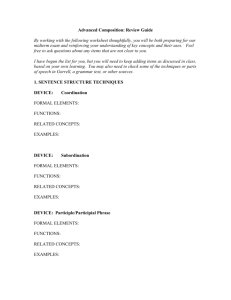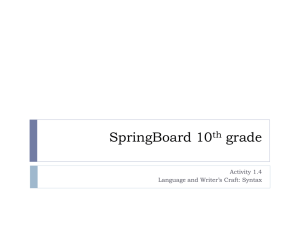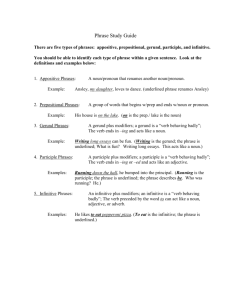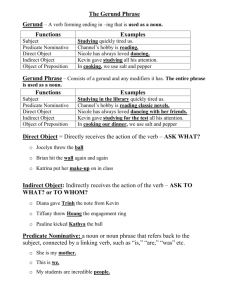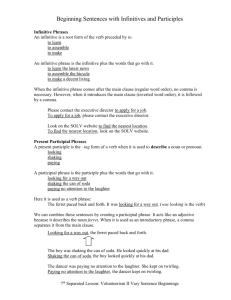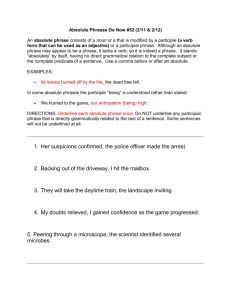SENTENCE VARIATION MODELS
advertisement
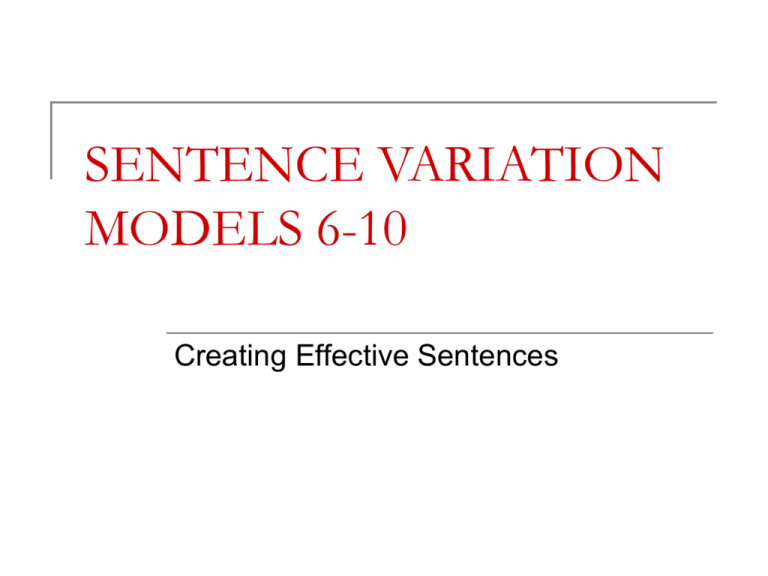
SENTENCE VARIATION MODELS 6-10 Creating Effective Sentences SVM #6: Begin with present tense PARTICIPIAL PHRASE. Present tense means that it is “happening now.” A PARTICIPLE is any verb that can be used as an adjective. Begin your sentence with a verb. Attach “ing” to the end of the same verb. (Remember to use the proper English spelling conventions when doing this.) For example: Verb = get Get + t + ing = getting. Getting a bad grade on his report card, the boy knew he would be grounded for two weeks. Examples of SVM #6 Frightening the children nearest to him, the young boy hollered at the top of his lungs. Sitting at my desk, my behind fell asleep. Staring, the crowd began to laugh at the poor girl on the ground. Living over four hundred years ago, Leonardo da Vinci kept journals of his ideas and inventions. Working hard throughout the rest of the year, Dad was able to spend the holidays at home with us. Now it’s your turn. Using your first five vocabulary words, write five sentences that begin with a participial phrase in the present tense. SVM #7: Begin with a past tense PARTICIPIAL PHRASE. Past tense means that something has “already happened.” A PARTICIPLE is a verb that can be used as an adjective Begin your sentence with a verb. Attach “ed” to the end of the same verb. (Or use “having” + the correct past tense form of the verb.) For example: Verb = amaze Past tense of verb = amazed Amazed by her good luck, the girl took the money and ran. Examples of SVM #7 Confused by the directions, many of the students performed poorly on the test. Having sung his heart out, the contestant was disappointed that he wasn’t chosen for the prize. Followed closely by my younger brother, I went in search of the legendary treasure. Having seen this question before, she knew the answer immediately. Hammered by guilt, the slender girl confessed to her crime. Stunned by the news, Sophie turned and fled. Panicked by the storm, the horse kicked and whinnied in protest. Now it’s your turn. Using vocabulary words 6-10, write five sentences that begin with a participial phrase in the past tense. SVM #8: Begin with an ABSOLUTE PHRASE (or more than one). This is a phrase that contains a noun or pronoun and any other words that are needed to complete the thought. These phrases describe (modify) the rest of the sentence, not just one or two words in it. SVM #8: Begin with an ABSOLUTE PHRASE (or more than one). Create a sentence using was or were; then take out the was or were— that is an absolute phrase. For example, begin with: Then, remove the was or were and add a comma: Their minds were whirling from the avalanche of information provided by the teacher… His head was pounding… His hands were shaking… His heart was filled with fear… Their faces were reflected in the moonlight… Their footsteps were echoing in the stillness of the night… Their minds whirling from the avalanche of information provided by the teacher, … His head pounding, … His hands shaking, … His heart filled with fear, … Their faces reflected in the moonlight, … Their footsteps echoing in the stillness of the night, … All of the absolute phrases will talk about or describe the other actions of the subject of the sentence. SVM #8: Begin with an ABSOLUTE PHRASE (or more than one). In the following sentence, all of the phrases describe what else “John” is doing besides the main action in the sentence. His long journey ended, his weary feet aching, his bones icy with the cold, John entered the warm, cozy house. There are three absolute phrases. John is the subject of the sentence. Examples of SVM #8 Her eyelids fluttering, Sarah worked up the courage to ask Manuel out on a date. Sarah is the subject of the sentence. His stomach aching, his face turning green, Han regretted trying the strange new dish offered in the cafeteria at lunch. Han is the subject of the sentence. Now it’s your turn. Using vocabulary words 11-15, write five sentences that begin with one or more absolute phrases. SVM #9: Begin with an INFINITIVE or INFINITIVE PHRASE as the subject of the sentence. An INFINITIVE is the word to plus a verb. Some examples include: To walk To talk To think An INFINITIVE PHRASE is an infinitive followed by additional words that complete a thought. Some examples include: To drink a nice, hot cup of tea To bring peace to a war-torn world To express herself well Examples of SVM #9 To drink a nice, hot cup of tea was Yesenia’s only wish as she huddled in the cold alley that winter night. To bring peace to a war-torn world was his fervent prayer to the deity he so strongly revered. To express herself well seemed to be the best strategy for winning the election. To finish putting up the decorations before the snow arrived became the goal of the whole family. Now it’s your turn. Using vocabulary words 16-20, write five sentences that begin with an infinitive or infinitive phrase. SVM #10: Begin with a GERUND or GERUND PHRASE as the subject. A GERUND is an “ing” verb that functions in the sentence as a noun. The GERUND PHRASE is the gerund plus any of its modifiers. In the sentence below, “reading a good book” is a thing (a noun) which someone can enjoy. Therefore it is not only used as a noun, but is also the subject of the sentence. Reading a good book is the best thing to do on a cold, rainy day. Examples of SVM #10 Talking on the cell phone is what many students like to do best. Playing sports will help you stay in shape. Studying before a test is a good strategy to help you pass your classes. Looking your best gives you greater selfconfidence and courage. Now it’s your turn. Using vocabulary words 21-25, write five sentences that begin with a gerund or gerund phrase.
